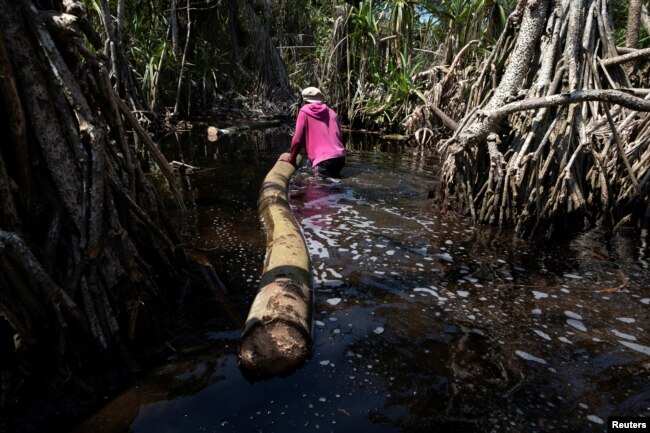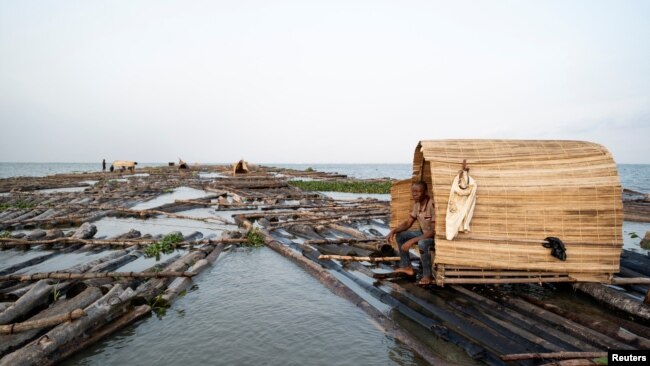消えゆく森林 in Nigeria
斧や伐採機といった誰でも手に入る道具があり、目の前には木があり、他に収入源となる産業がない地域では、アフリカだけでなく、南米でも同じことが問題視され、温暖化に拍車かかるとの懸念がなされています。
VOAで英語を学びましょう!!
ナイジェリアの消えゆく森林、木の数より上回る伐採者(和訳)
In Nigeria's Disappearing Forests, Loggers Outnumber Trees
June 13,2022
アフリカ西海岸の国、ナイジェリアの森の奥で、エゴボントルワ・マリギさんは働いていました。彼は、斧や鉈を使って木を切り倒す伐採人です。
彼が働いていた森は、ナイジェリアの南西部にあるオンド州です。しかし、その森では多くの木が違法伐採で失われています。
61歳の2児の父はロイターに対し、森のどこでも15本以上の木を切り倒すことができますが、2本見つかれば幸運だと語ります。
「先祖の時代には大きな木があったが、悲しいかな、今あるのは小さな木ばかりで、切る前に成熟させることさえしない。」とマリギさんは話します。
マリギさんは木を伐採した後、他の伐採者に自分が所有者であることを知らせるために、木に目印を付けています。伐採された木、つまり丸太は、水路や川を使ってナイジェリアで最も人口の多い都市、ラゴスに運ばれます。
ナイジェリアの木は、農地を開くため、あるいは人口増加によるエネルギー需要を満たすために伐採されています。2001年から2021年までの間に、ナイジェリアでは114万ヘクタールの樹木が失われたと言われています。
グローバル・フォレスト・ウォッチは、データを提供し、森林の状態を追跡しています。同団体によると、ナイジェリアの樹木被覆が11%減少することは、温室効果ガスである二酸化炭素の排出量が5億8700万トンに相当するとのことです。
ムハマド・ブハリ大統領は、コートジボアールのアビジャンで最近開催された生物多様性、つまり生物環境の状態に関する国連の会合で講演を行いました。彼は、ナイジェリアが国内の森林を再生するために資金を提供していると述べました。しかし、ナイジェリアでは森林の消失が急速に進んでいるため、それだけでは十分ではないかもしれません。
フェミ・オバドゥン氏は、オンド州農務省の森林管理局長です。「森を守ることは、私たち自身を守ることです。森を破壊することは、人類を破壊することなのです。」と彼は言います。
マリギさんはそのことをよく理解しています。しかし、彼は生計を立てなければなりません。
伐採から数カ月後、マリギさんは運搬できるように40本の丸太を結束するため森に戻りました。他の伐採業者と一緒に、オンド州からラゴスまでの水路で丸太を引っ張ためにタグボートを買いました。
彼らは、風雨をしのぐために丸太の上にシェルターを作りました。食料を分け合い、元気を出すために地元の歌を歌いました。丸太が船から離れないように、彼らは夜も眠らりません。
船はさらに伐採者とその丸太を拾い集めるために何カ所か停泊しました。1隻の船で数千本の丸太を運ぶことができます。
マリギさんの旅はラゴスで終わり、オンド州や他の地域の丸太が集まってきました。丸太は切り出され、利用者に販売されます。
In Nigeria's Disappearing Forests, Loggers Outnumber Trees
Egbontoluwa Marigi worked deep in a forest in Nigeria, a country on the western coast of Africa. He is a logger who cuts down trees using an axe and a machete.
The forest where he worked is in the Ondo State in southwest Nigeria. But many trees in that forest have been lost to illegal logging.
The 61-year-old father of two told Reuters that he could cut down over 15 trees anywhere in the forest, but he would be lucky to find two.
"During the time of our forefathers, we had big trees but sadly what we have now are just small trees and we don't even allow them to mature before we cut them," Marigi said.
After cutting down the trees, Marigi put markers on them to let other loggers know that he is the owner. The cut-down trees, or logs, are then transported by waterways and rivers to Nigeria’s most populated city, Lagos.
Trees in Nigeria are cut down to open land for farming or to feed the energy demand of a growing population. From 2001 to 2021, Nigeria has lost 1.14 million hectares of tree cover.
Global Forest Watch provides data and follows the state of the forests. The organization says that the 11 percent decrease in tree cover in Nigeria equals the emissions of 587 million metric tons of carbon dioxide, a greenhouse gas.
President Muhammadu Buhari spoke at a recent UN meeting on biodiversity, or the state of the biological environment, in Abidjan, Ivory Coast. He said that Nigeria has provided money to help regrow the country’s forests. But that may not be enough as the country loses forests even more quickly.
Femi Obadun is the director of forest management for Ondo state’s agriculture ministry. He said, “Protecting the forest means protecting ourselves. When we destroy the forest, we destroy humanity.”
That is something Marigi knows well, but he must make a living.
Months after cutting the trees, Marigi returned to the forest to tie his 40 logs together so they could be transported. With other loggers, he paid for a tugboat to pull the logs through waterways from Ondo state to Lagos.
They built shelters on top of the floating logs to help protect themselves from the weather. Food was shared and they sang local songs to cheer themselves up. They did not sleep at night to make sure that the logs would not get away from the boat.
The boat stopped at several places to pick up more loggers and their logs. A single boat can transport thousands of such logs.
Marigi’s trip ended in Lagos where logs from Ondo state and other parts of the country came together. The logs were then cut and sold to users.
Words in This Story
allow – v. to permit (someone) to have or do something
mature – v. to continue developing to a desired level
humanity – n. all people
tugboat – n. a small, powerful boat that is used for pulling and pushing ships especially into harbors or up rivers

